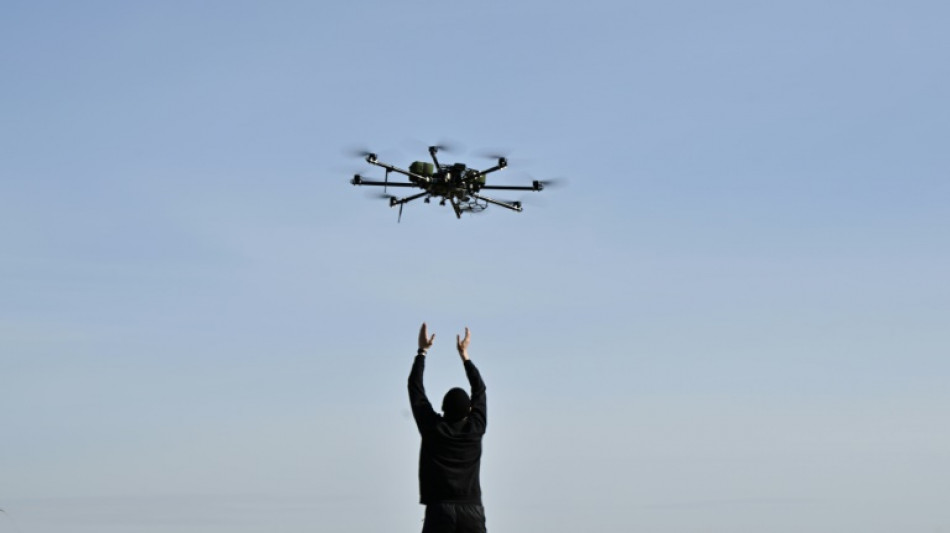
-
 Troubled Man City held by lowly Everton, Chelsea title bid rocked
Troubled Man City held by lowly Everton, Chelsea title bid rocked
-
Paterson, Bosch give South Africa edge over Pakistan in first Test

-
 Oil leak in Peru tourist zone triggers 'environmental emergency'
Oil leak in Peru tourist zone triggers 'environmental emergency'
-
Mozambique post-election violence kills 125 in three days: NGO

-
 Finns probing ship from Russia for 'sabotage' of cables
Finns probing ship from Russia for 'sabotage' of cables
-
Williams hits unbeaten 145 as Zimbabwe make Afghanistan toil

-
 Bowlers bring Pakistan back into first Test in South Africa
Bowlers bring Pakistan back into first Test in South Africa
-
Banbridge foils French to land King George VI Chase for Ireland

-
 Man City pay penalty for Haaland miss in Everton draw
Man City pay penalty for Haaland miss in Everton draw
-
Paterson takes five wickets as Pakistan bowled out for 211

-
 India's Kohli fined for Konstas shoulder bump during fourth Test
India's Kohli fined for Konstas shoulder bump during fourth Test
-
Kremlin cautions on 'hypotheses' over plane crash

-
 Pakistan military convicts 60 more civilians of pro-Khan unrest
Pakistan military convicts 60 more civilians of pro-Khan unrest
-
Turkey lowers interest rate to 47.5 percent

-
 Syria authorities launch operation in Assad stronghold
Syria authorities launch operation in Assad stronghold
-
Record number of migrants lost at sea bound for Spain in 2024: NGO

-
 Kohli called out over shoulder bump with Konstas during fourth Test
Kohli called out over shoulder bump with Konstas during fourth Test
-
Rural communities urged to flee east Australia bushfire

-
 Sri Lanka train memorial honours tsunami tragedy
Sri Lanka train memorial honours tsunami tragedy
-
Australia's top order fires to take charge of 4th Test against India

-
 S. Korea's opposition moves to impeach acting president
S. Korea's opposition moves to impeach acting president
-
'We couldn't find their bodies': Indonesian tsunami survivors mourn the dead

-
 Azerbaijan mourns 38 killed in plane crash in Kazakhstan
Azerbaijan mourns 38 killed in plane crash in Kazakhstan
-
Konstas and Khawaja put Australia on top in 4th Test against India

-
 Lakers pip Warriors after another LeBron-Curry classic
Lakers pip Warriors after another LeBron-Curry classic
-
India readies for 400 million pilgrims at mammoth festival

-
 Nepal hosts hot air balloon festival
Nepal hosts hot air balloon festival
-
Asia stocks up as 'Santa Rally' persists

-
 Tears, prayers as Asia mourns tsunami dead 20 years on
Tears, prayers as Asia mourns tsunami dead 20 years on
-
Sydney-Hobart yacht crews set off on gale-threatened race

-
 Key public service makes quiet return in Gaza
Key public service makes quiet return in Gaza
-
Fearless Konstas slams 60 as Australia take upper hand against India

-
 Bridges outduels Wembanyama, Celtics lose again
Bridges outduels Wembanyama, Celtics lose again
-
Hungry Sabalenka ready for more Slam success

-
 Ryde Marks a Transformative Milestone in Singapore's Mobility Landscape
Ryde Marks a Transformative Milestone in Singapore's Mobility Landscape
-
Network-1 Commences Patent Litigation against Citadel Securities and Jump Trading

-
 Kidpik Announces Suspension of Trading of Common Stock on Nasdaq and its Intention to Appeal
Kidpik Announces Suspension of Trading of Common Stock on Nasdaq and its Intention to Appeal
-
SMX Integrates Its Proprietary Coating and Digital Platform Technology for NFC & RFID Chip Markings and Protection

-
 DeepWay Completed 750 Million RMB Series B Financing to Accelerate the R&D of Intelligent New Energy Heavy Trucks
DeepWay Completed 750 Million RMB Series B Financing to Accelerate the R&D of Intelligent New Energy Heavy Trucks
-
Mass jailbreak in Mozambique amid post-election unrest

-
 Azerbaijani jet crashes in Kazakhstan, killing 38
Azerbaijani jet crashes in Kazakhstan, killing 38
-
Bridges outduels Wembanyama as Knicks beat Spurs

-
 2004 Indian Ocean tsunami: what to know 20 years on
2004 Indian Ocean tsunami: what to know 20 years on
-
Asia to mourn tsunami dead with ceremonies 20 years on

-
 Syrians protest after video of attack on Alawite shrine
Syrians protest after video of attack on Alawite shrine
-
Russian state owner says cargo ship blast was 'terrorist attack'

-
 38 dead as Azerbaijani jet crashes in Kazakhstan
38 dead as Azerbaijani jet crashes in Kazakhstan
-
Crisis-hit Valencia hire West Brom's Corberan as new boss

-
 Suriname ex-dictator and fugitive Desi Bouterse dead at 79
Suriname ex-dictator and fugitive Desi Bouterse dead at 79
-
35 feared dead as Azerbaijani jet crashes in Kazakhstan


Cheap drones 'cannot match' artillery power in Ukraine: experts
Ukraine is relying on the massive use of drones to compensate for an artillery shell shortage and undermine Russian military capabilities, but experts warned they cannot tip the balance.
Both drones used for strikes hundreds of kilometres away and commercial drones are starting to dominate the battlefield.
In particular, so-called First Person View (FPV) drones allow their pilots to see live images of the ground as if they were on board and can locate enemy units and, if armed with explosives, attack them from within a few kilometres.
"At the moment in Ukraine, we are seeing the use of drones on an unimaginable scale, we are really talking about tens and hundreds of thousands of drones on the battlefield," Ulrike Franke, a researcher at the European Council on Foreign Relations (ECFR), told AFP.
In its 2024 budget Kyiv earmarked 1.15 billion euros ($1.25 billion) for drones, and President Volodymyr Zelensky announced that the country will produce "one million drones" this year, after setting up a specific drone branch in February.
Kyiv's direction comes as its supporters are trying to bolster Ukrainian stocks -- London is set to deliver more than 10,000 drones, of which one thousand are FPV drones, and Paris is preparing to order 2,000 kamikaze drones, some of which will be used in Ukraine.
Ukrainian officials estimate between 100,000 and 120,000 drones are needed monthly.
Whereas it needs 200,000 to 250,000 artillery shells per month for a major offensive or 75,000 to 90,000 to sustain the war defensively, according to an Institute for Strategic Studies (IISS) review.
Western backers largely depend on US stocks to sustain defence, but Kyiv does not have enough ammunition to launch a major offensive next year, it added.
So "Ukraine can reduce its requirements for artillery ammunition by significantly increasing production of strike drones" continued Michael Kofman and Franz-Stefan Gady in the IISS review.
Drones are "capable of reproducing many of the functions of artillery and missiles at a fraction of the cost", agreed Mykola Bielieskov of the Atlantic Council.
A small commercial drone costs just a few hundred euros, whereas a simple anti-tank missile, artillery shell or remotely operated munition costs several thousands.
- "Not ideal" -
Ukrainian FPV drones are currently responsible for between 65 and 85 percent of the destruction of Russian positions, according to a French military source.
But Ulrike Franke warned: "They use drones because they can produce or buy them, but it is not ideal."
FPV drones have a small load capacity of just hundreds of grams of explosive and a few kilograms for the largest commercial drones.
"Even large numbers of small drones cannot match the potency of artillery fire," agreed Stacie Pettyjohn in a study by American security think-tank "CNAS".
Drones can supplement indirect fire weapons, but they are not substitutes, she added.
In September, the New York Times reported that less than a third of drone strikes hit their target, as the machines can easily be jammed or disrupted by electronic countermeasures.
Ukraine can no longer count on superiority in the field of drones.
In 2022 Ukraine had a "9-to-1 advantage" in commercial drones but this lead has now "essential disappeared", Pettyjohn added.
"While the Russian Ministry of Defence was slow to catch up, Russian troops had quickly realized the utility of commercial quadcopters and volunteer groups had emerged to provide frontline soldiers with drones and the necessary training."
Russia also relied heavily on FPV kamikaze drones to thwart Ukraine’s counter-offensive last summer.
For Pettyjohn, although drones offer new capabilities, they ultimately make it more difficult to "concentrate forces, achieve surprise, and conduct offensive operations" so they will not make "truly disruptive change".
burs-mra/tq/ico/spb/cw
L.Davis--AMWN


